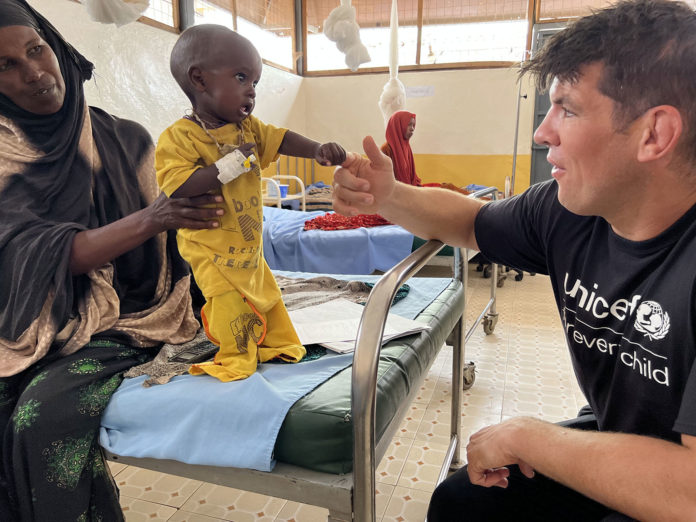
Former Munster and Ireland rugby star Donncha O’Callaghan has revealed he was shaken to the core by scenes he witnessed in Somalia as devastating drought puts the country on the brink of the world’s first famine in five years.
The Unicef ambassador told how streams of desperate people are walking up to 100km to reach aid camps – but some mothers have been found sitting by the gravesides of children who did not make it.
An Irish team which included Mr O’Callaghan spent a week in camps observing what may be one of the world’s first climate change-induced famines.
“It is truly harrowing. It has taken me days at home to finds the words for how I feel,” said the Corkman. “I’ve never seen anything like the camps in Somalia. The sheer number of children left staring into the abyss because of this drought is terrifying.
“It is not just one case. It is hundreds. It is thousands. I met mothers and you could see they were starving and weak when they arrived. The look in the eyes of the kids left me speechless. When you see a child suffering from hunger so close up, it really shakes you to the core.”
Unicef estimates Somalia’s first famine since 2011 could be declared within weeks and already over 7 million Somalis have been affected by drought.
DEATH RAIN
The country has two rainy seasons annually and the human catastrophe has been sparked by four consecutive failed rains since 2020 – a drought on a scale not seen in at least 40 years.
Paradoxically, when rain arrives, it also presents a lethal danger to children suffering from severe acute malnutrition, a scenario witnessed by O’Callaghan, who visited three camps for displaced people in the Dollow region.
“On one of the days, we had a brief shower of rain. You could see the delight and relief in the children’s faces.
“However, we later heard from the Unicef team that when a child is malnourished, being outside in the rain, when their system is weak, can actually put their life at risk from hypothermia. Where we were in Somalia, some of the locals called it death rain.
“Famine is not new to us in Ireland and we need to be there for the children of Somalia now amid the dangers they face, so we’re asking anyone in a position to support the relief effort to do so at unicef.ie.”
NEEDLESS DEATHS
Speaking after his week-long mission to the stricken country on the Horn of Africa, where temperatures reached 30C, he recalled meeting a two-month old baby girl, already acutely malnourished.
“I met her and her mum. I didn’t know before the trip that a baby’s face and limbs will swell and their hair can go grey when they are malnourished. It’s heartbreaking to witness.”
UNICEF Ireland Executive Director, Peter Power, told how the “needless deaths” of children demands a response.
“The scale of this drought and the devastation it is wreaking on children, must demand that we do more to tackle climate change,” he said. “Global emissions are still going up, and as a global society, we simply can not continue with business as usual. We are standing on the precipice of a climate catastrophe.
“If declared, this will be a famine fuelled in large part by climate change. But already children are dying. They are dying because of the excesses and lifestyles of others far from their home. Children in Somalia are the early casualties of a potentially global disaster. It is not of their making, and it is our duty to do more and stand by their side.”
You can help Unicef’s relief effort at unicef.ie







